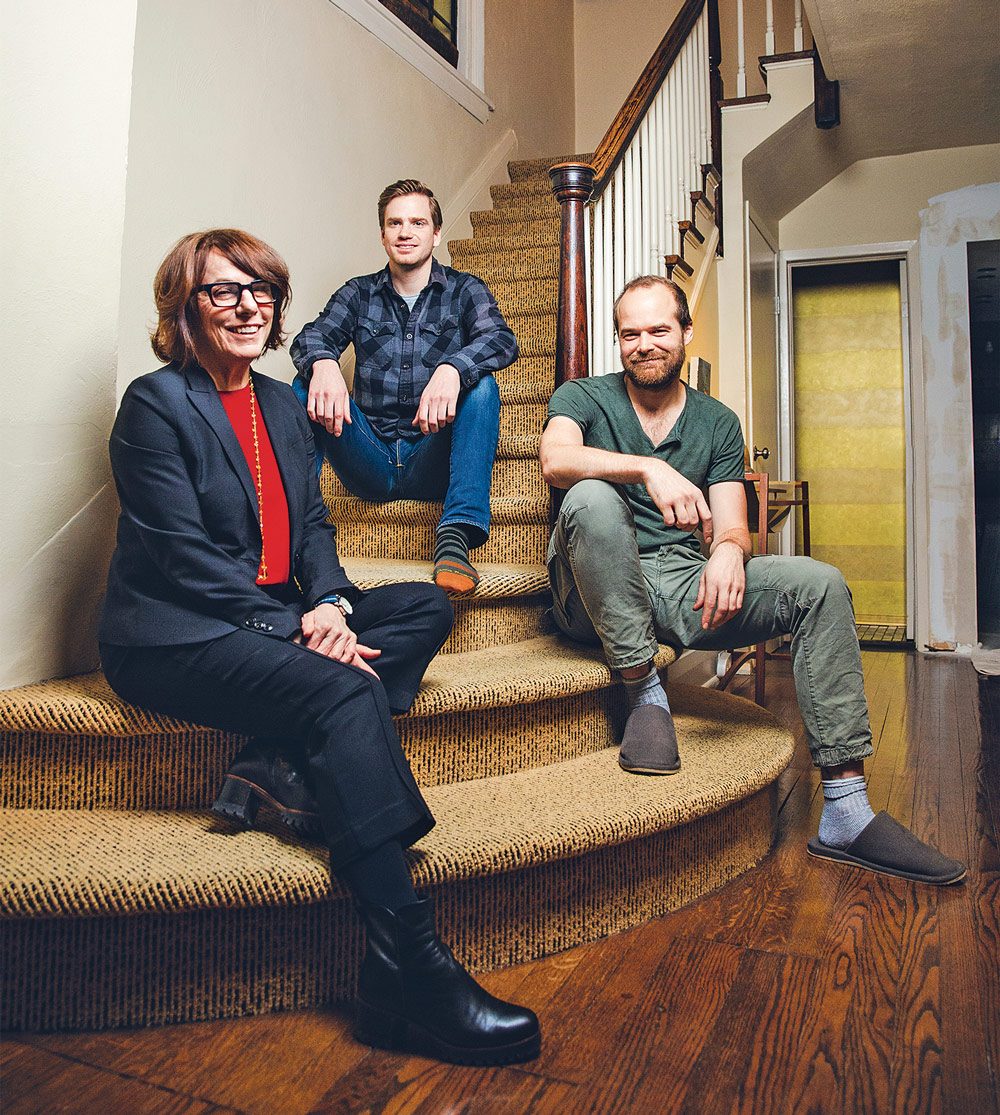Taking in Boarders Forced Me to Share My Space and, I’ll Admit, Become a Nicer Person
As Toronto’s housing crisis grew, I decided to rent out my home to boarders.

Mrs. Bradbury’s Boarding House
I’m sitting at my shiny white kitchen table, round and bright as a happy face, and talking to Sara, my boarder. Sara’s face is not happy, and one of the perils of turning your home into a boarding house is an unhappy tenant.
Sara is sad because she thinks my squat stucco house in Toronto, where she began renting a room in the summer of 2017, is infested with bugs.
“It’s just the occasional fly because I don’t use screens,” I say, waving my hand at the flung-open windows. A summer breeze eddies around us. “So.”
The So is for finality, to get Sara out the door to the University of Toronto lab where she spends long hours dissecting brains for her PhD thesis, because as I speak an enormous insect is rappelling from the ceiling toward Sara’s hair, its arms snapping hungrily.
“But you see here,” Sara’s brown eyes well with worry as she rolls up her pant leg to reveal a large red welt. “It is—what is the word?”
“Oozing,” I say. Sara speaks excellent English, with only an occasional lost phrase. (“I wish you could understand me in Persian,” she once said. “In Persian I’m witty and sophisticated.”)
“It’s just a mosquito bite,” I say, and hope this is true. The Volkswagen-sized bug—are those pincers?—is now inches from her head. “Stop scratching.” As the owner of a boarding house, I am allowed to say bossy things like this.
Sara rents a room in my home, on the second floor. Peter, a lovely, soft-spoken teacher and musician, is in the basement apartment. Until last March, my son Kelly lived in the bedroom beside Sara’s. He’s a grounded young man with a quick mind. Home between travel and work as a web developer, Kelly played the role of the household pragmatist.
Housing so many entitles me to be smugly satisfied that I’m on the supply end of the country’s rental demand. You’ve heard the numbers. In 2018, Toronto and Vancouver’s vacancy rates were sitting at around 1 per cent, but the problem is far more widespread. The same year, Prince Edward Island’s available rental stock for a three-bedroom apartment was zero. You read that right. With a national vacancy rate of 2.4 per cent at last count, we have a coast-to-coast renting crisis. Meanwhile, longtime homeowners such as myself rattle around in our Miss Havisham manors, empty now with the kids grown.
I’d like to say that guilt over my greedy set-up is why I opened Mrs. Bradbury’s Boarding House, but the truth is I was having trouble sleeping. The house had been broken into twice, the second time in mid-afternoon as I sorted bills at the dining-room table. My bag was on the window ledge, and the thief hoisted himself halfway through the open window before he saw me sitting there. He paused, calculated his timing, and grabbed my bag before I could lunge from my chair. I have to say I admired his follow-through. I didn’t know whether to call for help or ask for his resumé.
After that, I woke up thinking how sad it would be to be murdered. Finding a boarder was a solution to a practical problem. I needed a good night’s sleep.
My decision to take in roomers was not met with widespread approval. “Mom. No.” My daughter Mary was alarmed by my lack of self-knowledge. I was letting her old room and needed her to box up her kindergarten art projects. “You don’t even like people,” Mary continued. “You especially don’t like people in your own space. Who make messes. And talk to you.” Perhaps I had once or twice terrorized Mary’s friends who specialized in all of the above. I may have been known as Scary Mommy for a couple of their teenage years.
Laura, my sister who lives nearby, worried about safety. She didn’t get the concept of taking in roomers so I wouldn’t be murdered. Opening my house was opening myself to the vagaries of the universe. “What you want is a graduate student,” she decided. “Quiet, female. Try U of T housing.”
Clear ground rules came up a lot with friends pondering something similar: the living room’s off limits, assign food shelves, no talking in the morning—especially not to me, apparently.
Worse than the character analysis was the pitiless mockery. Think of those too-genteel boarding-house women unsparingly fictionalized by James Joyce, William Trevor and Arthur Conan Doyle—believe me, I did. “How’s our Mrs. Hudson?” became a standard greeting.
It turns out, however, that I am now on trend: I am progressive and modern instead of marginalized and batty. Toronto HomeShare, launched in 2018, is a city-funded project that takes on intergenerational home-sharing. It’s a two-birds, one-stone solution, matching seniors with too much space to students with too little money.
To our south, Nesterly, a startup in Boston, is betting intergenerational home-sharing can be a profitable business. “Housemates can exchange help around the house for lower rent.”
I have had three roomers so far, and chores around the house are not part of the equation. Like me, they are far too busy. Rebecca, comedian and acquaintance in town for a few months from L.A. where she worked, was my first toe-dab into the boarding-house lifestyle. Rebecca would enter my large wooden front door with a lusty “Hel-oo-oo!” and bang out a couple of tunes on the piano in the pauses between her brilliantly paced stories about shopping for tampons. You knew when Rebecca was home, in other words.
Yulina, Boarder #2, was so quiet I could rarely tell whether she was at home in her room or at school. She responded to an ad I posted at U of T housing and checked all of Laura’s boxes. She was pursuing an undergraduate degree and has previously worked in London and Frankfurt. Originally from South Korea, she has the not-quite-present look of someone getting ready to make her next move—Yulina arrived and departed with the same compact suitcase. After nine months, she was slightly chattier, and to her this was a transformation.
“Cathrin, can you believe how shy I was when I first came? And how different I am now?” She wasn’t the only one in transition. My hair no longer caught fire if Yulina was already at the kitchen table when I came down in the morning. We even chatted over coffee.
Sara was next. She is perhaps the least chore-oriented of the three so far, although not for a lack of willing spirit. Sara arrived with quite a lot of luggage. I was not kind about this. “You’re renting a room, not half a house,” I said, and grudgingly agreed to let her add a few of her favourite dishes and pots to my tightly orchestrated kitchen. Ixnay to her stacks of Tupperware. This is the other peril of running a boarding house: you find out the ways in which you are a tool.
One thing Sara didn’t arrive with was a knowledge of daily practicalities. My son and I have secretly wondered if she is perhaps an Iranian princess. She once asked if she could put gold-gilded china in the oven at 350 F, and another time started a small kitchen fire after she put her dinner to boil on the gas stovetop and wandered off to think. She has a lot to think about. Her doctoral specialty is the interconnectivity of brain tissue.
“What have you learned?” I asked her early on.
“Nothing,” she said, and hid her face in her hands, ever modest. “Imagine standing in the vast ocean with a teaspoon of water in your hand. That teaspoon is how much we know about the brain.”
“Well, it’s kind of like a computer,” Kelly said, and I imagined carrying around the latest Apple upgrade on my shoulders. “The brain is nothing like a computer,” said Sara. “You can’t find a storage bank in a brain, for example.” She and Kelly would discuss this for the next hour.
I gave up a few things taking in boarders: having the bathroom to myself, blaring Leonard Cohen at full blast, and my own space, which turns out to be less valuable than I once thought it was. But as I have come to know Sara, I understand how much more she’s left behind. She never watches The Handmaid’s Tale, for example, because it is too much like modern-day Iran. “My friends and I lived this.”
She swam in the Caspian Sea as a girl, and longs to swim in a northern Ontario lake. One weekend she rented a car and drove north with her mask and snorkel, turning down road after road on Lake Joseph in Muskoka only to end up at the bottom of another cottager’s driveway. She came home defeated, unable to find a public place for a swim. I was terribly hurt by her disappointment, and I began to understand her isolation. Being Mrs. Bradbury of the boarding house, my first impulse was to fix it.
But some things don’t fix easily, and Sara understands this better than me. When she is homesick she brings out her bag of Cheetos—and I mean one bag. She unfailingly offers to share it. “It’s console eating?” she says. “Consolation eating,” I say. It was Kelly who noticed that, in the first few months of her stay, she never ate more than three Cheetos at a sitting. “She’s had that bag for three months.” They are friends now, and will remain so, I think. It makes me happy to come home to them talking about brains or Trudeau or whether crunchy or puffy is the best Cheetos style.
That December, Sara invited Kelly and me to celebrate Yalda, the winter solstice. She prepared a spread of sweets, nuts and pomegranate, served with a silver spoon, and three kinds of tea: sour orange blossom, gol gavzaban and camomile.
“My father would say I have done it all wrong. The tea is not fresh enough, the colour should be dark red, not black, and so on. He is the master of this.” Sara’s parents are still living in Iran. They refuse to suffer the border interrogations and indignities that travelling to North America entails. In May 2017 they had met for a holiday in Istanbul, Turkey being one of the few countries to which Iranians can travel without a visa.
Sara came home with two beautifully wrapped teas, from her mother to me. One to calm me down, and one to bring me peace. Apparently these are different, but I felt I needed both. When I wrote Sara’s mother to thank her, I told her what a privilege it was to have Sara in my home.
Yasaman wrote back that she wished she’d been in my kitchen to make the tea for me. “I cried when I read the part you wrote about Sara. She is my first daughter and she has made all the dreams I had for her come true. She makes an effort to be the best in every aspect of her life.”
Sara has made me better too, more aware of the way I take my world—my home, my dishes, my access to northern lakes—for granted.
If there are actual dangers to taking in boarders, I haven’t encountered them. Instead, the world feels kinder, smaller and more personal. Yasaman closed her letter by inviting me to visit Iran. I hope to take her up on the invitation, and any more that might come by way of my boarders.
© 2018, by Cathrin Bradbury. From ‘‘Amid the housing crisis, I took in boarders. Next came the pitiless mockery,’’ (The Star, October 3, 2018). thestar.com






